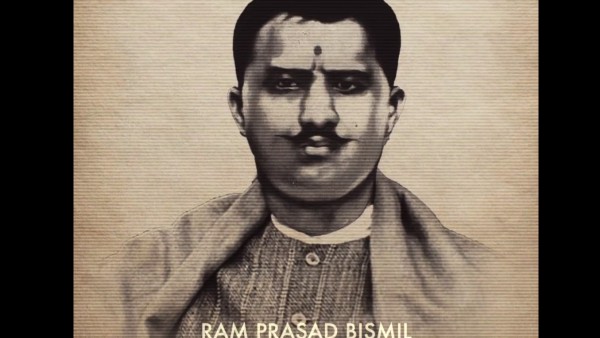
Ram Prasad Bismil: A great revolutionary with a poet’s heart
New Delhi, Jun 11: In the history of India's struggle for independence, Pandit Ram Prasad Bismil, a freedom fighter, has a very special place. In memory of his contribution towards the freedom movement, June 11 is celebrated as his birth anniversary.
Bismil was a brave revolutionary who gave up his life smilingly for the sake of the Motherland. He was known for his courage and fearlessness in carrying out dangerous activities against the colonial rulers in India.

The young freedom fighter had lit the fire of revolution to push India on the road to freedom. He led the famous Kakori rail dacoity conspiracy.
Early life
Bismil was born to a Brahmin family in 1897 in Shahjahanpur, Uttar Pradesh. His father, Muralidhar's earnings were insufficient to sustain the family, so he stopped his schooling after the eighth standard. Ever since his childhood days, he was a strict follower of Arya Samaj founded by Dayananda Saraswati.
Literacy works
Apart from being a freedom fighter, Bismil was also a poet and a writer who had a command of both Urdu and the Hindi language. He has written several poems under the pen names Ram, Agyat, and Bismil. From numerous quotes to poems, he wrote, each one portrayed the same thrive for freedom of the land from the British colony.
The famous works of Bismil include 'Sarfaroshi Ki Tamanna' and the song 'Mera Rang De Basanti Chola' which he wrote while residing in the Jail.
Life
as
a
Revolutionary
When Bismil was 18-years-old, the news of death sentence of Indian Revolutionary Bhai Parmanand (an Arya Samaj activist) had a deep impact on him and he decided to dedicate his life to the elimination of British rule in India. Parmanand's death sentence was later commuted.
After Mahatma Gandhi withdrew from the Non-Cooperation Movement in 1922 following the Chauri Chaura incident, in which many policemen were killed, Bismil and many other revolutionaries were sorely disappointed. They decided to oppose the British in their own way. With the help of his fellow revolutionaries, Bismil started The Hindustan Republican Association, a revolutionary group.
He was one of the chief founders of the revolutionary organisation Hindustan Republican Association (HRA). His team members consisted of great freedom fighters like Ashfaqulla Khan, Chandrasekhar Azad, Bhagawati Charan, Rajguru, and many more. Released in 1925, it promised equal rights for everyone and put an end to discrimination.
The organisation's name was later changed to 'Hindustan Socialist Republican Association' in 1928 as Bhagat Singh gained more influence.
As it was difficult to fund their revolutionary activities, Bismil planned to carry out a robbery, which was called the Kakori train robbery.
Kakori conspiracy
Bismil was known for being a part of the Manipuri conspiracy in 1918 and the Kakori incident in 1925.
He executed a meticulous plan for looting the government treasury carried in a train at Kakori, near Lucknow in UP. This historical event happened on 9 August 1925 and is known as the Kakori conspiracy. The idea behind the Kakori conspiracy was to secure belongings from the British government. However, there was no bloodshed, except for one passenger killed accidentally.
Death
Soon the British government cracked down on the Kakori conspirators, and arrest warrants were issued. While Chandrasekhar Azad managed to evade the crackdown, Bismil was arrested along with Ashfaqullah Khan, his close associate.
After a long trial that lasted for a year-and-a-half, Bismil, along with Ashfaqullah, Roshan Singh and Rajendra Lahiri were sentenced to death.
It was during his stay in prison that Bismil wrote his autobiography, which is considered one of the finest works in Hindi literature.
On 19 December 1927, just before the execution, his mother Moolrani went to the jail to meet his son for the last time. At the sight of his beloved mother, Bismil could not control his emotions and broke down, she did not lose her courage and told him that she was proud to have a son like him.
Moolrani was accompanied by the revolutionary Shiv Verma, whom she had described to the prison authorities as her nephew. Bismil hid the hand-written manuscript tiffin that his mother had brought, and handed it over to Shiv Verma, who was successful in bringing the manuscript outside jail premises. These pages were later printed in the shape of a book by Bhagvaticharan Verma.
Soon thereafter, the printed copies of the book were confiscated and the publication banned. After India's Independence in 1947, this autobiography of Bismil was published under the cover title of Kakori ke shaheed by Ganesh Shankar Vidyarthi in 1928 by Pratap Press, Cawnpore. A rough translation of this book was prepared by the Criminal Investigation Department of United Province in British India.
Later, at a very young age of 30, the British government executed him on 19 December 1927 in Gorakhpur Jail.
Today, some of Bismil's personal belongings, including a blanket that he used in jail, are kept at Haryana Archaeological Museum, Gurukul Jhajjar (Haryana).


 Click it and Unblock the Notifications
Click it and Unblock the Notifications


































